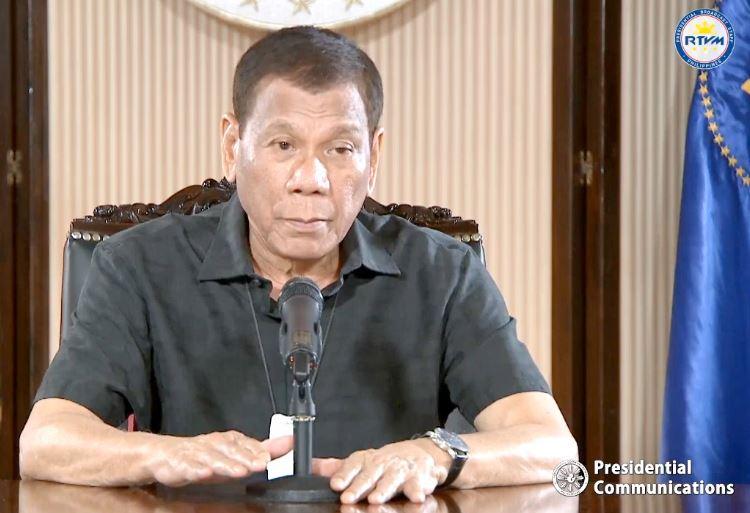As we witness the excruciatingly slow and inefficient governance of this administration, more lives are on the line – not only due to the dreaded disease but also due to hunger and desperation.
By RONALYN V. OLEA
Bulatlat.com
MANILA – One week after being granted emergency powers, President Rodrigo Duterte is still acting as if there is no public health emergency, much less a pandemic.
Forget that the nation waited for almost eight hours last night for his address and that he filed his first weekly report to the Senate past midnight.
The President’s 18-page report shows how little his administration has done to contain the spread of the coronavirus disease 2019 (COVID-19), or even to provide social and economic support to those hardly hit by the enhanced community lockdown.
Despite being given the power to reallocate, reprogram and realign budget allocation of the executive department, no budget has been reallocated, reprogrammed or realigned because the Inter-Agency Task Force for the Management of Emerging Infectious Diseases (IATF-EID) has yet to submit its budgetary requirements for COVID-19 response. Yes, it has been three weeks into the Luzon-wide enhanced community quarantine and there is still no budget.
Moreover, no special purpose funds (SPF) have been used to address the pandemic, except for the P500-million replenishment of the Department of Health (DOH)’s quick response fund. A total of P372.7 billion is allotted for SPF, according to the Department of Budget and Management (DBM).
Besides the provision of 18,000 surgical masks to three major hospitals, the report is silent on the purchase of the much- needed test kits and personal protective equipment (PPE) for health workers. The DOH has not yet utilized its P9.94-billion released allotment for COVID-19 response and has so far relied on donations from foreign governments and foundations.
The field testing and validation of test kits developed by the University of the Philippines-National Institutes of Health is still ongoing. The field implementation of 26,000 tests in five hospitals funded by Department of Science and Technology (DOST) will take place early April.
Other “achievements” cited in the President’s report include the decontamination of 415 checkpoints, government facilities, schools, hospitals and market, and the conversion of 19 public buildings and evacuation centers as health facilities and 15 others as food hubs and/or emergency operation centers.
What has been done for public health workers?
The Department of Public Works and Highways (DPWH) deployed 402 vehicles to transport health workers all over the country. The number of vehicles is not enough for thousands of public health workers especially in Metro Manila.
The National Transmission Corporation has allowed the use of its dormitory facilities to house health workers of the Lung Center of the Philippines.
Frontliners combat COVID-19 amid rotten public health system
Frontliners stage #ProtestFromWards to call for protection amid COVID-19 pandemic
Moreover, the Department of Budget and Management has prepared a draft issuance to provide COVID-19 special risk allowance for all public health workers.
Social protection wanting
The Department of Labor and Employment was able to provide P5,000 cash assistance to 8,641 workers. The number of beneficiaries is only 0.45 percent of the more than 190,000 affected by closures due to the lockdown.
DOLE said it has listed 51,293 beneficiaries for its Tulong Panghanapbuhay sa Ating Displaced/Disadvantaged Workers Program (TUPAD). For ten days, a worker will be paid the regional minimum wage for sanitizing/disinfecting his/her house. For both programs, DOLE said it has earmarked P95.4 million.
‘Inaccessible,’ ‘exclusionary’ DOLE cash assistance criticized
Again, DOLE has not yet tapped a big chunk of its P4.35 billion existing released allotment for COVID-19 response, based on DBM data.
The Department of Social Welfare and Development (DSWD) meanwhile has at its disposal a total of P133.86 billion for COVID-19 response, according to DBM.
As of March 29, DSWD distributed food and non-food items to 4,753 individuals amounting to P22.31 million. If the 69,200 purchased family food packs would be counted (though not yet distributed), the DSWD’s beneficiaries comprise only 1.5 percent of the five million poorest families.
While Malacañan Palace was quick to justify the need for the passage of the Bayanihan to Heal as One Act, all actions so far by the executive did not necessitate such. While the Palace was quick to defend the appointment of retired military generals as implementers of the so-called National Action Plan, no substantial and decisive measures have been done.
As we witness the excruciatingly slow and inefficient governance of this administration, more lives are on the line – not only due to the dreaded disease but also due to hunger and desperation.
‘Without mass testing, PH fighting COVID-19 blindly’ — doctors
The Filipino people continue to demand mass testing, upgrading of hospitals, enough protection for all health workers and adequate socio-economic relief for the most vulnerable sectors of society. Without these, the ongoing lockdown is tantamount to mass detention.
The post Mass detention happens due to government’s lockdown inefficiency appeared first on Bulatlat.

